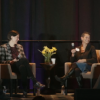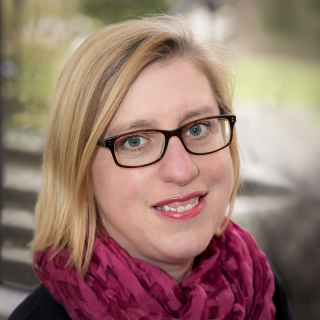
Aidan’s Key’s usual 9 to 5 includes fielding calls from principals who say things like, “How soon can you get here? We have a transgender child at our school and we’re not sure what to do.”
It’s just another day at work for the gender specialist.
As the founder of Gender Diversity, Key educates educators, parents, and organizations about issues relevant to gender exploration in children and teens. And every year Gender Diversity shares this valuable insight with a conference (this year, it’s August 8 through 12 at the downtown Seattle Convention Center).
Now in its 17th year, the Gender Odyssey conference focuses on the needs and interests of transgender and gender-diverse children, their loved ones and the professionals who serve them.
ParentMap readers might be most interested in Family Program [from August 10 through 12]. Among other activities, attendees can participate in a Kids Day Camp that includes crafts, games, musical guests and even juggling lessons.
“The magic is them getting to see other kids like themselves,” Key says of the camp. “They get to feel what it feels like, for one whole weekend, to be considered the norm. It’s like a gender future we dream about: This is what life should be like.”
Older kids also have a program specific to their interests. “They have their own panels of adults to talk to,” says Key. The panels include professionals ranging from doctors to attorneys to college students who identify as transgender or nonbinary.
“These sessions mean [the teens] can understand their rights and not have to share these speakers with an adult audience,” says Key.
Also on the docket: several keynote events including one with physician Kate O’Hanlan, who recently made headlines for her groundbreaking study about the biological origins of gender and sexual orientation.
To learn more about the conference — which is still accepting attendees — ParentMap spoke with Key, who also shared how he helps educators and communities create safe spaces for trans children and what’s changed since we last talked with him.
I last spoke with you right after the election of President Donald Trump in November 2016. Since then, the Trump administration has removed gender-inclusive guidelines for U.S. schools. What else have you seen change in the past two years?
Educators and parents still have the same questions and concerns; we don’t need to rely on guidance — although it helps! — to know that taking care of all children is the right thing to do.
I recently did four half-day trainings in rural Colorado for school administrators, counselors and teachers. Afterward, I learned 75 percent of this district is Republican. Each audience responded first and foremost as educators who care about all of their children. They listened and recognized that many of their initial fears [for example, about trans students using locker rooms or bathrooms] were nebulous and little foundation.
I’ve worked with schools, families and their children for more than 10 years. The key to successful, forward movement is to honor the collective distress and address the concerns in a respectful manner.
Every conversation moves the needle forward. Every media story expands the understanding of those who read it. It moves what feels to be an intimidating topic into a story about friends, neighbors and family friends. It makes something that was once unknown into a known variable. Once we know more, we fear it less; it’s just human nature.
Still, this changed political climate has brought more volatility to my work. There are right-wing conservatives and religious groups who are happy to name me and paint me as a villain. They’ll say you need to at least bring in another educator who can bring in the “other side of the issue.” To me, there is no “other side” to the acceptance and inclusion of all children.
What can adults learn from kids?
Children are more likely to have a clear understanding of the concept of gender identity. A kid will say “I’m a boy in my heart and mind” and other children really understand this statement. Children are not struggling with the baggage that we have acquired from decades of living with misconceptions.
I spoke with a doctor recently who told his 7-year-old child that identical twins are always the same gender. The child said, “Dad, that’s untrue. What if one of them is transgender?”
Even though we have had information for some time that genitalia doesn’t always match a person’s gender identity, we still have a hard time really knowing this fact but here’s a kid saying she already understands this fact!
Wow! What a story. Based on your experience working with kids, what else do you think we adults can learn from them?
We can learn the straightforward, matter-of-fact uncomplicated way that children think about gender. We, as adults, can trace our distress to direct or insinuated portrayals of transgender people as mentally ill or deviants, when we were young. Think about the character, Norman Bates in the movie “Psycho.”
In one scene, we see him wearing a wig and dress. In another, he’s violently stabbing someone in a shower! Of course, we as adults are struggling! That’s why I have compassion for the resistance and distress that shows up for parents and educators. It’s all based on fear.
We as adults have gender double standards that have been such a norm in our culture that we don’t even consider the facts. I think about the shock I see on the faces of young children when I tell them that, once upon a time, girls and women couldn’t wear pants to school. Yet we have a level of terror that occurs if a boy wants to wear a skirt to school. A principal will call me and say, “How soon can you get here? We have a boy that wants to wear a skirt to school.”
I tell the principal that the kids are going to ask, “Why’s he wearing a dress?” Possible answers are simple; they include: “Because he likes that dress” or “Because it looks good on him.”
Adults sometimes can experience some paralysis around this issue, but kids readily absorb simple, truthful responses and move on.
Let’s talk about this year’s Gender Odyssey Conference in Seattle.
In the professional portion of the conference, we have a full tract of offerings for educators and administrators. We offer information on OPSI (or, Office of Superintendent of Public Instruction) guidelines for supporting transgender children, information on the changing legal landscape and how to educate all children … Absolutely there are going to be fears and issues from adults in any particular community. We’ll address how to acknowledge, and not judge, those fears and issues while stepping into the conversation with your community.
[We also] offer "How did I get here?” sessions for people who are just starting a journey; perhaps their child said just two weeks ago that they think they are transgender. We talk about what that means and what the beginning of the journey looks like.
We’ll talk about the complexity that comes from all the aspects of our identity, too. What if your family and extended community is Muslim? What if you are a grandparent raising your trans granddaughter and also a deacon at your African-American Baptist church?
We also talk about the fact that a white trans boy, who has early puberty intervention and then cross hormone treatment will likely be indistinguishable from any white boy on the planet. How is his experience different than that of a trans girl who is African-American, who, statistically speaking, has a life expectancy of age 35. We want to talk about things like the complexity of being black and trans in a society that still is so fearful of trans people.
How do you create a safe space for every family on a transgender journey while still talking about the added barriers some people face due to race, gender and class differences?
It’s important that we do our best to provide space for every type of family. Every family is often expected to be a spokesperson in their community. Since the media still primarily features only white families, how do we deepen the discussion to include how race, class, geography and level of physical or intellectual ability can so deeply complicate any particular child’s experience?
I want each of us to recognize how complex this journey is. We all have a huge learning curve and I want us all to stay in the game and understand there’s a lot to learn. If you can find peace with the continual learning, you’ll be learning amazing things for the rest of your life.
If we really are committed to making change in the world, it comes with some volatility, eating humble pie and occasionally licking wounds. You know to keep going you have to forgive yourself for acting from a place of misinformation. So many parents, for example, express sadness and regret that they were not able to support their children sooner.











